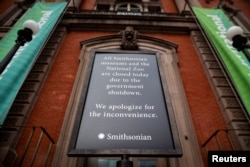U.S. President Donald Trump vowed Tuesday to not cave in on his demand for a wall along the U.S.-Mexican border as the longest-ever partial government shutdown extended into a second month.
Senate Republicans began efforts to try to end the shutdown and approve Trump's wall as part of a package of measures proposed by the U.S. leader that for three years would protect hundreds of thousands of immigrants in the U.S. from deportation back to their homelands.
Meanwhile, the U.S. Supreme Court dealt the Trump administration a defeat, saying it would not immediately act on its request to end the program started by former President Barack Obama to protect nearly 700,000 people brought to the country as children from deportation, allowing them to stay in the country indefinitely.
A Senate vote could come Thursday, but there so far is no indication that enough opposition Democrats would support the legislation to ensure its passage.
Day 32 of shutdown
The shutdown has furloughed 800,000 government civil servants, with 420,000 forced to continue working without pay and the remainder sent home, some of whom have been forced to look for temporary work elsewhere to help pay their household bills. All are set to miss their second biweekly paycheck on Friday.
House Speaker Nancy Pelosi, the leader of the Democratic-controlled House of Representatives and a vocal opponent of Trump's wall, said, "Securing our border is a responsibility that we all know and we share. It’s an oath we take to protect and defend the American people and that’s one place, not just the southern border but all of our borders. So let’s hope that the president will stop holding the federal employees hostage. They provide so much of the needs of the American people."
Various proposals to end the stalemate between Trump and Democrats opposed to his wall along part of the 3,200-kilometer border with Mexico have gone nowhere. Democrats have demanded that he reopen the government and then negotiate border security measures, but Trump has refused.
Meanwhile, some government services have been curtailed as about 10 percent of airport security agents ordered to work have instead called in sick.
Some food inspections have been cut back, and museums and parks closed. Federal courts could run out of money by Friday to continue their operations.
The Senate Republican proposal includes $5.7 billion for Trump's wall, a favorite pledge of his during his successful 2016 run for the White House, although he has abandoned his claim that Mexico would pay directly for it and now is seeking U.S. taxpayer funding. He says the border barrier is needed to stop illegal immigration.
60 Vote majority
Republicans hold a 53-47 majority in the Senate, but most major legislation requires 60 votes for passage, meaning Trump would need to win the votes of at least seven Democrats, although none have agreed so far to support it.
In an effort to win Democratic support, Trump is calling for three years of protection against deportation for young immigrants who were brought to the country illegally when they were children and who are enrolled under a program known as Deferred Action for Childhood Arrivals (DACA) that was started by former President Barack Obama.
The same deportation protection would apply to people who fled to the U.S. from Latin American and African countries because of violence or natural disasters. Trump has previously sought to end both programs.
The Republican plan would add 750 border patrol agents and 375 customs officers, as well as technology upgrades at ports of entry. It would boost funding for immigration enforcement, including adding 2,000 law enforcement, support and legal personnel, and thousands of vehicles.
Rules for children from El Salvador, Guatemala and Honduras seeking asylum would become stricter.
The proposal calls for those minors to apply for asylum at one of several processing centers to be set up in Central America.
Republicans say the changes would reduce the incentives for people to make the dangerous trip to seek asylum at the U.S. border.
The Democratic-controlled House of Representatives has passed several bills aimed at reopening the government, but Senate Majority Leader Mitch McConnell has refused to put them up for a vote in the chamber because Trump does not support them. House Democrats are promising to vote for more border security measures this week, but none that include Trump's wall.







